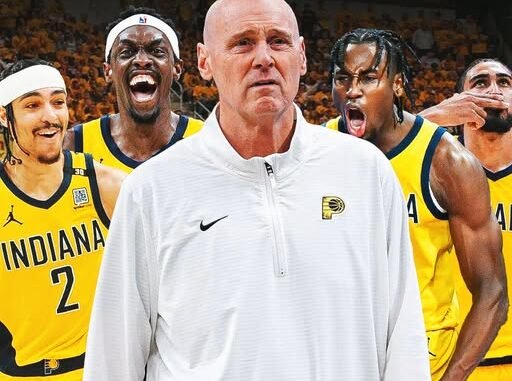
The Phoenix and the Ashes: How the Pacers, in a Moment of Deepest Pain, Redefined Their Future
The celebratory parade for the Indiana Pacers’ unexpected trip to the NBA Finals has long since ended. The confetti, swept from the streets of Indianapolis, is now a distant memory. But what lingers is not the triumphant feeling of a championship, but the crushing weight of two devastating realities that have shaken the franchise to its core. The season-ending Achilles tear to their franchise point guard, Tyrese Haliburton, and the emotionally gut-wrenching free-agency departure of their beloved veteran center, Myles Turner, to a rival have left some calling the Pacers “the NBA’s biggest victims of circumstance.”
This sentiment, while understandable, is a gross oversimplification. To see the Pacers as mere victims is to ignore the complex, and in many ways, brilliant, decisions their front office has made in the face of incredible adversity. What looks like a calamitous descent into a “gap year” is in fact a calculated and intentional “retooling” for a future that is now more defined than ever. The team is not in a state of chaos but in a state of controlled transformation, and their recent moves, while painful, are the foundation of a new era of Pacers basketball.
The first, and most devastating, blow came in the form of Haliburton’s injury. The non-contact Achilles tear, suffered in the first quarter of a pivotal Game 7 of the NBA Finals, was more than just a setback; it was a dagger to the heart of the team’s championship aspirations. Haliburton, the maestro of the Pacers’ high-octane offense, was the engine that powered the team’s historic playoff run. His absence for the entire upcoming season has forced a fundamental shift in the team’s philosophy. The Pacers will no longer be the fast-paced, ball-movement-heavy juggernaut that caught the league by surprise. They will be a team that relies on a more deliberate, half-court-oriented style of play, a system that, while less flashy, is designed to test the mettle of their young core and provide an unexpected opportunity for growth.
This is where the genius of the Pacers’ front office comes into play. In the immediate aftermath of the Haliburton injury, many in the NBA world predicted a period of despair and irrelevance for the franchise. But the Pacers’ front office, led by President of Basketball Operations Kevin Pritchard, saw something else. They saw a chance to redefine their team and to give a player with immense potential, but an often-unsettled role, the chance to prove his worth. The decision to name Bennedict Mathurin as the team’s starting shooting guard is the key to this grand experiment. With a more deliberate offense and more opportunities to create, Mathurin will finally be unleashed, given the space and freedom to leverage his immense scoring talent and play to his strengths. What looks like a demotion for the team is a promotion for a player who could very well be their next star.
But the retooling didn’t stop there. The departure of Myles Turner, a fan favorite and the longest-tenured Pacer, was a brutal and emotional moment for the fanbase. While Turner reportedly wanted to stay in Indiana, the team, faced with the NBA’s new, punishing “second apron” luxury tax, made the difficult decision to let him walk. Turner, in a shocking move, signed with the rival Milwaukee Bucks, a team that the Pacers had eliminated from the playoffs in the two previous seasons. To some, this was a clear sign of the Pacers’ lack of commitment to winning, a team that, in its moment of triumph, chose to prioritize fiscal responsibility over continuity.
This, too, is a gross misreading of the situation. The Pacers’ front office is not a victim of circumstance; they are a master of it. The team’s fiscal discipline, a hallmark of their organization for two decades, is a strength, not a weakness. By not paying the luxury tax for a team that, without its best player, is no longer a championship contender, the Pacers have maintained their long-term flexibility. They have avoided the crippling financial penalties that would have limited their ability to make future trades and draft picks. The departure of Turner, while painful, was a calculated move that ensures the Pacers can continue to build and acquire talent in the coming years. It was a tough decision, but it was a smart one.
The Pacers are not victims; they are innovators. They are a team that, in the face of a once-in-a-generation injury and an emotionally charged departure, has found a way to not only survive but to thrive. They have a clear path forward, a vision for a team that, when Haliburton returns in 2026, will be even more dangerous and more complete. The upcoming season is not a throwaway year; it is an opportunity for young players like Bennedict Mathurin and Jarace Walker to take on new roles and blossom into the players the front office knows they can be. It is a season of growth, development, and, ultimately, a new beginning.
So while some may want to call the Pacers victims, the truth is far more complex. The Pacers are a franchise that, in a moment of deep pain, chose to redefine themselves. They are a team that saw a dark cloud and found a silver lining. They are not victims of circumstance; they are the authors of their own destiny, and their new chapter, one that is built on resilience, forward-thinking, and a commitment to their long-term vision, may just be the most exciting one yet.
Leave a Reply